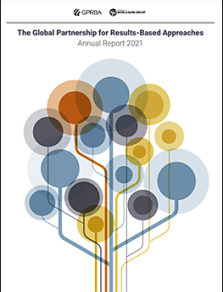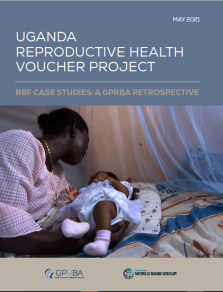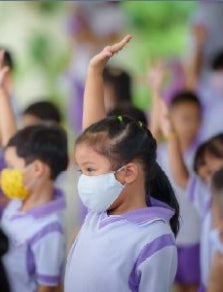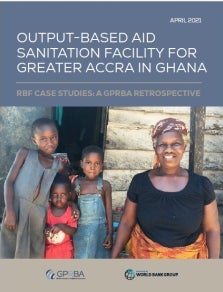Resources
-
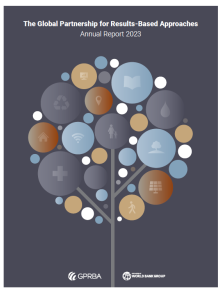
GPRBA Annual Report 2023
FY23 was an important year for GPRBA, underscored by two significant achievements. First, a $6.6 million GPRBA grant package was approved for the Yemen Integrated Urban Services Emergency Project II (YIUSEP II). Second, GPRBA held the RBF Forum in May 2023 in Nairobi, Kenya, the first in person…
GPRBA AR2023(8.55 MB)Date: 2023
Region: Global
Country: Global
-

-
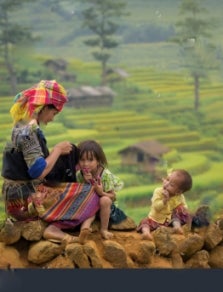
Vietnam Quality Improvement of Primary Education for Deaf Children Project (QIPEDC)
The development objective of the QIPEDC Project was to increase primary school-aged deaf children’s access to Vietnamese Sign Language (VSL) and improve their learning outcomes. Thanks to the project’s interventions, nearly 2,000 deaf students in 20 provinces across Vietnam were given the…
Date: 2023
Tags: Education
Region: East Asia and Pacific
Country: Vietnam
-
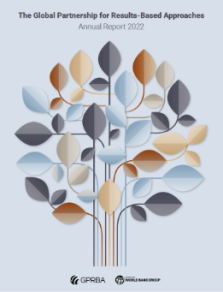
GPRBA Annual Report 2022
As of June 30, 2022, the GPRBA portfolio consisted of 58 grant projects in 7 sectors, spanning over 30 countries and 1 territory, for a total grant commitment of $304.7 million and cumulative disbursements of $224.8 million. The portfolio continued to maintain a strong focus on International…
GPRBA AR2022(10.54 MB)Date: 2022
Region: Global
Country: Global
-
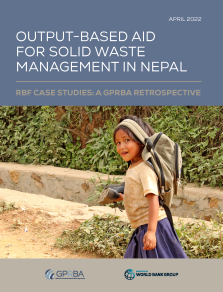
Output-Based Aid for Solid Waste Management in Nepal
This case study is part of a series to highlight project components that have enabled GPRBA to successfully deploy results-based finance (RBF) approaches for the provision of basic services to low-income communities, with efficiency, transparency and accountability. This analysis focuses on the…
Output-Based Aid for Solid Waste Management in Nepal(2.96 MB)Date: 2022
Tags: Solid Waste Management, Fragile Situations, Urban
Region: South Asia
Country: Nepal
-
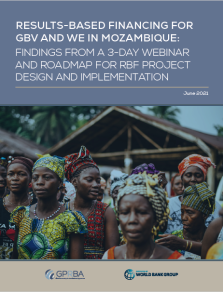
Results-Based Financing for GBV and WE in Mozambique: Findings From a 3-Day Webinar and Roadmap for RBF Project Design and Implementation
This report presents key findings from a 3-day webinar on results-based financing (RBF) for the prevention of and response to gender-based violence (GBV) and women’s empowerment (WE), with the objective of guiding development partners in Mozambique on how to integrate results-based approaches in…
Results-Based Financing for GBV and WE in Mozambique: Findings From a 3-Day Webinar and Roadmap for RBF Project Design and Imple(3.6 MB)Date: 2021
Tags: Gender
Region: Africa
Country: Mozambique
-
GPRBA Annual Report 2021
The Partnership broadened its mandate in 2019 to incorporate more flexible financing solutions beyond OBA, to keep up with the changing needs of our clients and to achieve greater impact. The name change to GPRBA marked this expansion. It made more RBF instruments available, and leveraged the…
GPRBA Annual Report 2021(10.71 MB)Date: 2021
Region: Global
Country: Global
-
Uganda Reproductive Health Voucher Project
This case study is part of a series prepared by the World Bank’s Global Partnership for Results-Based Approaches (GPRBA). The objective is to highlight project components that have enabled GPRBA to successfully deploy results-based finance (RBF) approaches for the provision of basic services to…
Uganda Reproductive Health Voucher Project(4.8 MB)Date: 2021
Tags: Health
Region: Africa
Country: Uganda
-
Outcome-Based Financing for Service Delivery; With Key Considerations for the Recovery From COVID-19
To improve their effectiveness in fighting poverty, development practitioners have increasingly adopted outcome-based financing (OBF) approaches. This paper explores whether and how OBF can contribute to overcoming the enduring service financing and delivery challenges, while also supporting…
Outcome-Based Financing for Service Delivery: With Key Considerations for the Recovery From COVID-19(3.96 MB)Date: 2021
Tags: Health, Urban
Region: Global
Country: Global
-
Output-Based Aid Sanitation Facility for Greater Accra in Ghana
This case study is part of a series to highlight project components that have enabled GPRBA to successfully deploy results-based finance (RBF) approaches for the provision of basic services to low-income communities,with efficiency, transparency and accountability. This analysis is focused on…
RBF Case Study: Output-Based Aid Sanitation Facility for Greater Accra in Ghana(2.84 MB)Date: 2021
Tags: Water and Sanitation
Region: Africa
Country: Ghana



